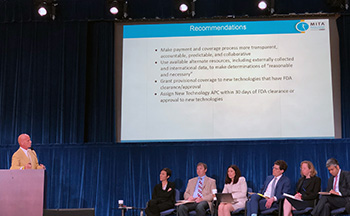 On June 20, the US Department of Health and Human Services (HHS) hosted a public hearing in Washington, DC, to seek input from a variety of stakeholders on their “ReImagine HHS: Accelerate Clinical Innovation” initiative.
On June 20, the US Department of Health and Human Services (HHS) hosted a public hearing in Washington, DC, to seek input from a variety of stakeholders on their “ReImagine HHS: Accelerate Clinical Innovation” initiative.
Mark Carol, MD, CEO of SonaCare Medical and Chairman of the Focused Ultrasound Working Group – which was established via the Foundation’s partnership with the Medical Imaging Technology Association (MITA) – was one of several speakers to address the panel, which included representatives from HHS, the National Institutes of Health (NIH), the Food and Drug Administration (FDA), and the Center for Medicare and Medicaid Services (CMS). Representatives from other leading medical device trade organizations and biomedical advocacy organizations also provided comments.
Carol, speaking on behalf of the Focused Ultrasound Foundation-MITA Focused Ultrasound Working Group, which represents several focused ultrasound manufacturers, made recommendations to address the lag time between FDA approval and CMS reimbursement, including:
- Make the payment and coverage process more transparent, accountable, predictable, and collaborative.
- Use available alternate resources, including externally collected and international data, to make determinations of ‘reasonable and necessary.’
- Grant provisional coverage to new technologies that have FDA clearance/approval.
- Assign an appropriate New Technology Ambulatory Payment Classification within 30 days of FDA clearance or approval of new technologies.
Carol cited partial gland prostate ablation (using focused ultrasound) as a prime example of how a potentially life-saving technology can fall between the cracks of FDA approval and CMS reimbursement. The procedure was authorized by the FDA, but lack of reimbursement forces patients to pay for treatment out of their own pockets. This limited utilization also makes it difficult to gather data needed for CMS to make a reimbursement decision.
To conclude, Carol said, “Modern medical technologies require a modern regulatory and reimbursement framework to be brought to market efficiently and adopted by healthcare providers expediently. The current coding, coverage, and payment processes present costly and time-consuming challenges due to a lack of transparency, accountability, predictability, and proactive encouragement of new technology, which limits patient access to better treatments and companies’ abilities to remain in the US market, or in business at all.”
In April 2018, MITA and the Foundation formed a working group with the goal of raising awareness of focused ultrasound technology among policymakers, payors, and medical specialty societies. The ultimate aim is to reduce barriers to commercialization and widespread patient access to focused ultrasound therapies.
Additional Resources
MITA Representative Speaks at HHS Public Hearing
MITA Backs Provisional Coverage of FDA-approved Tech at HHS Meeting
